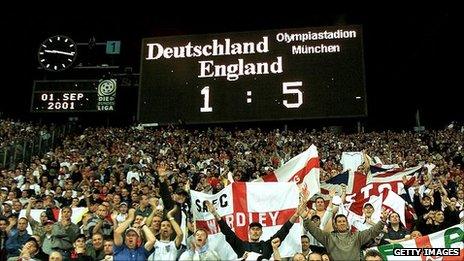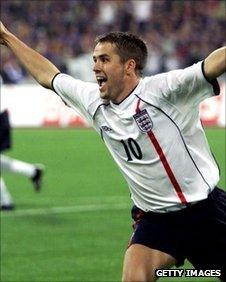Germany 1-5 England: Ten years on
- Published

The iconic scoreline that few expected
"Football is a simple game - 22 men chase a ball for 90 minutes and, at the end, the Germans win."
Those were the words of ex-England international and BBC presenter Gary Lineker after being knocked out of the 1990 World Cup by Germany.
English football has always sought to measure its success against Germany's but, given recent tournament performances, it's hard to disagree with Lineker's assessment.
Over the last decade Germany have reached one World Cup final, one European Championship final and two World Cup semi-finals - while England haven't even reached the last-four of a major tournament.
And that's not taking into account Germany defeating England 4-1, external in the last-16 of the World Cup in Bloemfontein last summer.
So it's hard to believe that 10 years ago - on 1 September 2001 in Munich's Olympiastadion - England won a World Cup qualifier 5-1, humiliating Germany in the process.
Carsten Jancker stabbed the ball home after only six minutes but England rallied and goals from Michael Owen and Steven Gerrard gave them a half-time lead.
But it was the next 45 minutes that arguably sent the two nations down very different paths over the next decade.
With Owen scoring two more for a fully-deserved hat-trick and Emile Heskey completing the rout, England looked a force to be reckoned with again.

Michael Owen celebrates scoring his second goal
Steve McManaman, who played for Real Madrid at the time, came on as a substitute that evening. He told BBC Sport: "Every time we went forward in the second half we looked like we were going to score. Bagging five against Germany made everyone sit up and notice us."
Even German World Cup-winning player and coach Franz Beckenbauer couldn't believe what he had witnessed. After the game, he said: "I had never seen an England team playing better football. They had pace, aggression, movement and skill. It was fantasy football."
It was a remarkable performance - arguably one of the national team's greatest - but, for Germany, defeat on such a scale was hard to swallow.
Karl-Heinz Rummenigge, who played in three World Cups, said: "I'd never witnessed such a terrible defeat. This was a new Waterloo for us."
It led to much soul-searching and, after crashing out in the group stage of Euro 2004, the German FA appointed Jurgen Klinsmann as coach.
Klinsmann, who now manages the United States, told BBC Sport: "[Current Germany coach] Joachim Loew and I began the whole regeneration process by trying to give our national team an identity.
"We eventually decided to go down an attack-minded route, passing the ball on the ground from the back to the front line as quickly as possible."
German journalist Raphael Honigstein acknowledges Klinsmann's vision as key to the nation's revival.
He said: "There were three components to his success; youth, style of play and the relative success of reaching the last-four [of the World Cup] in 2006. They combined to give everyone tremendous enthusiasm whenever Germany go into a tournament."
But, while Germany have reformed their national team and national association, the Premier League in England has become stronger, arguably to the detriment of the national team.
Highlights - Germany 4-1 England
Honigstein added: "In Germany you don't have levels of antagonism between various bodies. For every player the national team still comes first."
The Germany team are currently reaping the benefits from asking tough questions following that heavy defeat in 2001. If England are to become a world force again, perhaps they need to do the same?
But how different the future seemed on that September evening a decade ago.